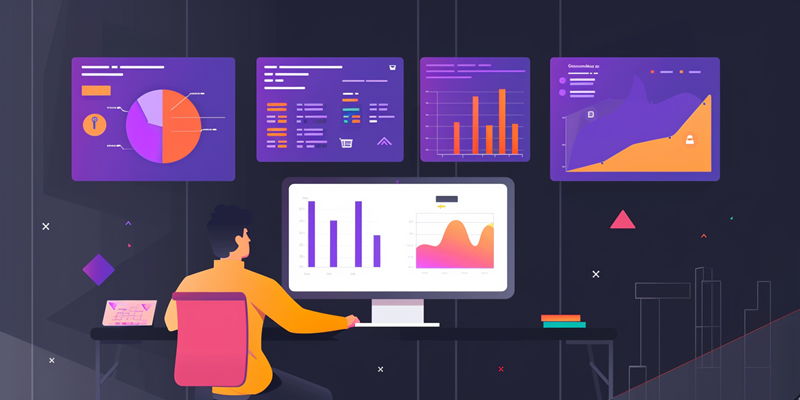In the fast-paced realm of business where decisions are data-driven, the significance of data science cannot be overstated. As we delve into the critical components of data science, drawn from the insights of Aileen Scott, it becomes clear that mastering these elements is not just beneficial for a data scientist’s career progression but is crucial for achieving precision and relevance in the application of their work. Each component plays a vital role in the grander scheme of decision-making across varied industries, creating a foundation for actionable insights and intelligent solutions.
The Heart of Data Science: Data Types and Collection
Understanding Structured and Unstructured Data
Structured data, with its clear organization in relational databases, stands in contrast to the more complex unstructured data, which includes emails, social media content, and multimedia files. The latter, rich with information, poses significant challenges due to its varied formats and the intricate processing required for meaningful analysis. To effectively leverage the depths of unstructured data, one must engage with sophisticated techniques, acknowledging that these richer veins of information can yield more nuanced insights and thus strengthen the outcomes of data-driven initiatives.
Advanced Techniques in Data Collection
To craft a robust dataset, one can employ an array of data collection techniques, ranging from web scraping to tapping into the wealth of information provided by company databases and sensors. A comprehensive approach to data collection ensures coverage of a broad spectrum of variables and supports holistic analysis, essential for uncovering hidden patterns and trends. The objective is to create a dataset that is as complete as possible, thereby providing a firm foundation upon which data analytics and decision-making processes can securely rest.
Constructing the Foundation: Data Engineering and Wrangling
Building Robust Data Frameworks
The integrity of data science lies in its ability to handle large volumes of information, which is facilitated by the critical work of data engineering. This involves constructing and maintaining frameworks for data storage and management, ensuring both reliability and accessibility. Data engineering is a fundamental aspect of the data science process, laying the groundwork for effective data analysis and enabling scalability to meet ever-increasing data demands.
The Art of Data Preparation: Cleaning and Structuring
Data wrangling emerges as a vital step in the journey from raw data to actionable intelligence. It involves a meticulous process of cleaning and structuring the data, addressing inaccuracies, removing duplicates, and normalizing the dataset. These steps are crucial for ensuring that the data is primed for analysis and that subsequent insights are based on accurate and consistent information. In essence, wrangling turns a chaotic mass of data into an organized, analysis-ready resource.
The Backbone of Data Science: Statistics and Programming
Embracing Statistics and Probability
A firm grasp of statistics and probability is paramount for any data scientist. These disciplines form the backbone of data analysis, enabling professionals to discern patterns, detect anomalies, and forecast future trends. A Forbes study has reinforced their importance, revealing that 74% of hiring managers see these skills as indispensable for candidates. Being proficient in statistics and probability not only improves modeling but also enhances the overall potency of predictive analytics.
Programming Languages: Python and R
When it comes to manipulating datasets, two giants lead the way: Python and R. Python is known for its simplicity and versatility, thanks to an extensive set of libraries geared towards data science. In contrast, R is celebrated for its statistical analysis capabilities. However, choosing between the two depends on the data scientist’s specific needs, with each language offering its own strengths and potential for enriching data analytics projects.
Making Insights Accessible: Data Visualization
Transforming Data into Visual Narratives
Data visualization is indispensable for simplifying complex datasets into comprehensible visual formats such as graphs, charts, and interactive dashboards. This transformation makes insights accessible to stakeholders who may not have technical expertise but need to understand the nuances of the data to make informed decisions. Effective visualization acts as a bridge, conveying intricate data stories in an engaging and intuitive manner.
Automating the Analysis: Machine Learning
Machine Learning in Data Science
Machine learning, a subset of artificial intelligence, amplifies the predictive power of data analytics by enabling algorithms to learn directly from data without being explicitly programmed. This automation ranges from detecting outliers to fine-tuning predictive models, and it continues to revolutionize the way that data science is approached and applied across different sectors.
Domain Knowledge: The Linchpin of Data Science
Importance of Industry Expertise
Possessing domain knowledge is tantamount to wearing a tailored suit—it fits the specific industry or sector with precision. Understanding the context in which a data science model operates is key to aligning analysis with business objectives. This nuanced understanding is what distinguishes a data solution that is merely functional from one that is transformative and impactful.
Advancing Your Career through Certification
The Value of Data Science Certifications
In the dynamic world of business, where data informs every strategic move, the importance of data science stands out markedly. Delving into the essential elements of data science, as highlighted by insights from expert Aileen Scott, it’s evident that mastering these aspects is not merely advantageous for the career growth of a data scientist, but it is also pivotal for the precise and relevant application of data science in their work. Each component is integral to the decision-making process across various industries, laying the groundwork for clear-cut insights and smart, innovative solutions. This expertise in data science is what differentiates good decisions from great ones, propelling businesses forward with a sense of certainty and savvy that is rooted in deep analysis and understanding. As the data landscape continues to grow and evolve, the mastery of these skills becomes ever more crucial for those who wish to stay at the forefront of the business vanguard.

